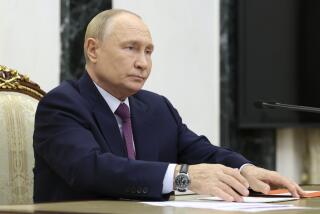Russia to Follow New Pragmatism in Its Foreign Policy
- Share via
MOSCOW — Foreign Minister Igor S. Ivanov set out a new foreign policy doctrine Monday, announcing that Russia’s approach will be more focused and pragmatic because of the country’s limited resources.
While asserting that Russia remains a superpower, Ivanov said the nation has to concentrate more on areas of strategic interest.
“Today, our foreign policy resources are relatively limited. And they will be concentrated in fields that are vital for Russia,” Ivanov said.
Ivanov said that Russia will continue to cooperate with the United States “despite the presence of significant differences.”
But he took a dig at the U.S., complaining that Russia’s hopes for a swift move to an equal partnership with America after the collapse of the Soviet Union had been dashed.
“I dare say our hopes for an automatic transition from a bipolar world to a broad partnership for international security have not been realized. We will have to strive for it, and it is not going to be easy,” he said.
He affirmed Russia’s staunch opposition to the U.S. plan for a national missile defense shield.
Ivanov’s comments followed President Vladimir V. Putin’s first state-of-the-nation address Saturday, a grim speech in which he warned Russians that they are dying off, falling into poverty and facing political chaos.
In part, the foreign policy doctrine formalizes the approach and rhetoric Russia has been taking in recent years. For example, Russia has been concerned about U.S. global dominance, and it prefers to see the U.N. Security Council as the key body for regulating international affairs.
Ivanov said that there was new pragmatism in the policy and that Russia would make realistic assessments on the hopes for change in international relations. His language relating to relations with the U.S. was downbeat. He spoke of the need to ensure that there are no pauses in contact and failures in negotiations, while affirming that the relationship is vital for international security.
After the heady optimism of the years following the breakup of the Soviet Union, when Russia’s foreign policy was unabashedly pro-Western, its relationship with the U.S. and the North Atlantic Treaty Organization has hit a prolonged rough patch.
The relationship deteriorated sharply after the U.S. pushed ahead with NATO expansion into Eastern Europe last year despite bitter Russian opposition. NATO’s military campaign against Yugoslavia in the spring of 1999 also infuriated Russia.
The doctrine noted that Russia will “treat the European Union as one of its major political and economic partners, and spare no effort to develop efficient, stable and long-term cooperation with it.” It also put greater emphasis on relations with Africa and Latin America.
Dmitri Y. Furman, an analyst for the Institute of Europe, a Moscow-based think tank, said the new doctrine seems designed to prove to America that the U.S. will no longer play a key part in Russian foreign policy and that Russia will form closer ties with other regions.
The attempt to play down the U.S. relationship is “ridiculous,” he said.
“The new concept is nothing but wishful thinking. It signifies the desire of some people in Russia’s political leadership to pretend that the U.S. is not so important for Russia. They would like to forget about the U.S., at least for a while.
“But in real life, the U.S. will remain what it has always been: a focal point in Russia’s foreign policy agenda since the end of World War II. We depend on U.S. policies and can’t pretend to be able to distance ourselves in any way from these policies,” Furman said.
More to Read
Sign up for Essential California
The most important California stories and recommendations in your inbox every morning.
You may occasionally receive promotional content from the Los Angeles Times.













